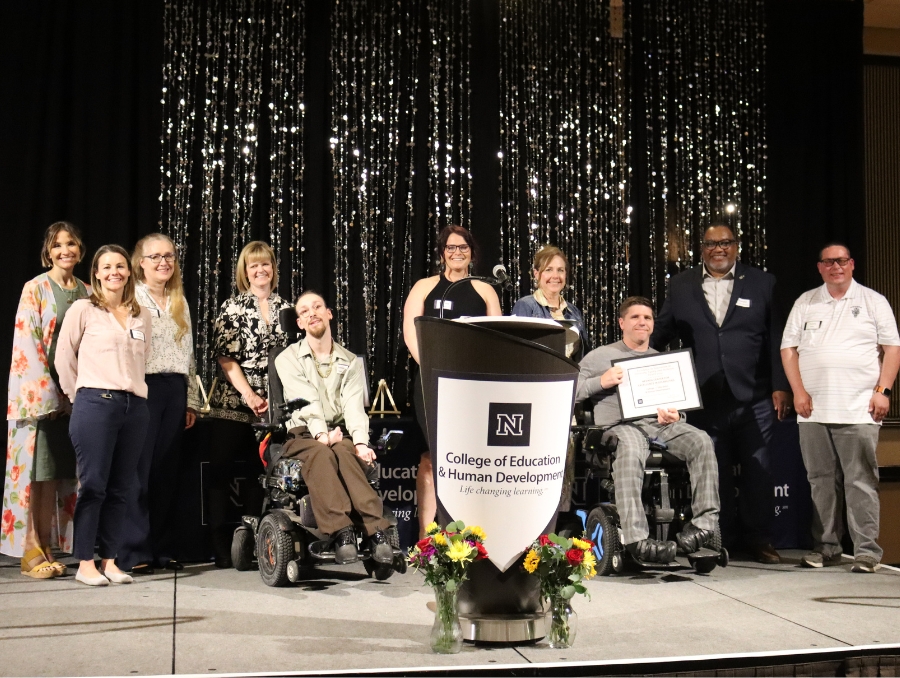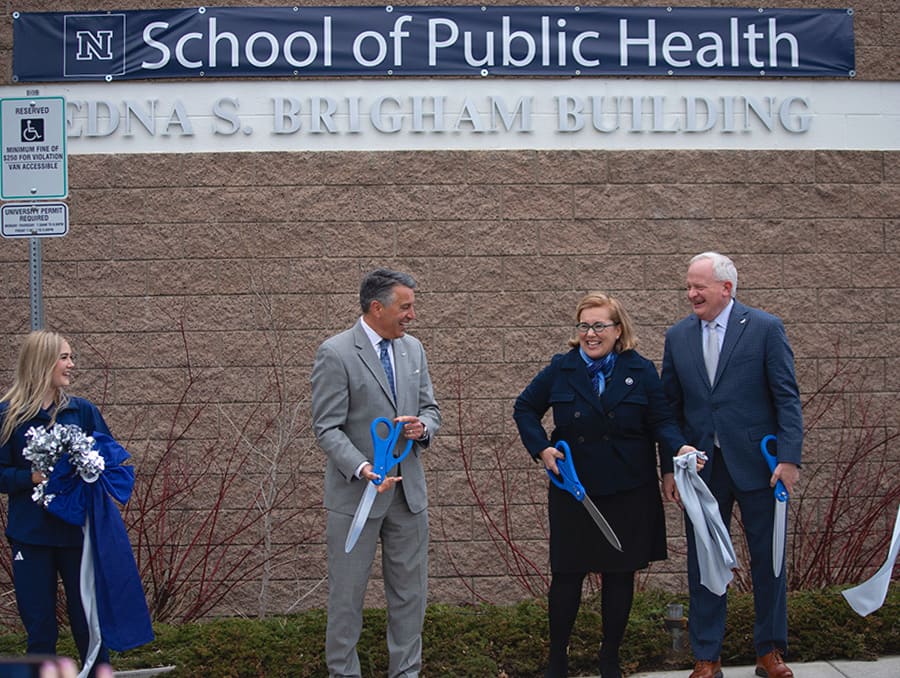The University of Nevada School of Medicine broke ground today on the first new medical research facility to be built at the University in more than 20 years. The Center for Molecular Medicine will house portions of the medical school's basic science research departments and serve as the headquarters for the Whittemore Peterson Institute for Neuro-Immune Disease and the northern center for Nevada Cancer Institute.
Portions of the microbiology, pharmacology, and physiology departments will move into the 100,000 square foot state-of-the-art facility, which will double the medical school's research and laboratory space. In addition to creating more space, the Center for Molecular Medicine is expected to increase the research productivity and funding of the school's basic scientists.
"This new facility will significantly expand the School of Medicine's ability to advance the work of our basic scientists," said John A. McDonald, M.D., Ph.D., vice president of health sciences and dean of the medical school. "Not only will we have the ability to expand our current basic science operation, but the building will allow us to develop new programs in addition to providing space for our clinical faculty to conduct research."
The Center for Molecular Medicine will also enable the medical school to increase its graduate student programs. According to University of Nevada, Reno President Milton Glick, Ph.D., breaking ground on the new facility is just one of the first steps toward expanding the School of Medicine.
"We believe that research is at the heart of every top-notch medical school," Glick said. "We have a very high quality medical school, but it is too small to meet the ever increasing healthcare needs of Nevada. Our state ranks 47th in the nation for physicians per 100,000 people. By expanding our medical school we have an opportunity to produce more physicians who remain to practice patient centered, highest quality medical care in our state. Building the new Center for Molecular Medicine is the first step toward fulfilling that mission."
Recognizing the need for improved health outcomes across the state, the University of Nevada School of Medicine, Whittemore Peterson Institute and Nevada Cancer Institute joined forces to secure state funding for the Center for Molecular Medicine project during the 2005 legislative session. With the strong support of State Senator William Raggio (R-Washoe), Senate Bill 105 passed securing $10 million in support of the project's public-private partnerships. Additional funding for the $78 million building stems from federal funds flowing from the research activities of all of the University's research scientists.
"Public-private partnerships have become increasingly important to the University," said Glick. "By sharing space in this new facility, all three parties will be able to achieve more than if they were to work individually. By coming together 'the whole will be greater than the sum of its parts,' and we will be able to make greater advances in research."
At the heart of the Center for Molecular Medicine is the goal to improve the health outcomes of Nevadans through research and clinical care. Sharing the research facility with the Whittemore Peterson Institute and Nevada Cancer Institute will create a synergistic environment for scientists to work together to conduct cutting-edge research that leads to better treatments for patients.
More than 15,000 square feet on the second and third floors will house the Whittemore Peterson Institute for Neuro-Immune Disease, the first institute of its kind in the United States. Dedicated to finding a cause and cure for Chronic Fatigue Syndrome and other neuro-immune diseases such as fibromyalgia, Gulf War Illness and autism, the Whittemore Peterson Institute will not only conduct research in the new facility but will also treat patients and develop educational programs for complex disorders of the immune system and brain.
"We're so excited to finally break ground on this facility," said Annette Whittemore, founding member of the Whittemore Peterson Institute. "The design of the building creates a dynamic setting that encourages researchers, clinicians and patients to interact. We have high hopes that in such a setting clinicians will be able to go from bedside to bench and back to bedside to bring better treatments to patients."
Nevada Cancer Institute, which will conduct research and patient-centered clinical trials in the new Center, will occupy 8,800 square feet on the first floor of the building. The Center for Molecular Medicine will act as the flagship for Nevada Cancer Institute's northern clinical and research operations.
"The new center will allow us to extend our mission of bringing new in-class and patient-tailored clinical trials to more of the state in support of the state's Comprehensive Cancer Plan," said Heather Murren, chief executive officer of Nevada Cancer Institute. "We have had great response already to the availability of Phase I and II clinical trials with more than 200 patients consented to participate in helping us to advance the search for the cure. We look forward to making these potentially life-saving measures more accessible for all Nevadans. In addition, we will be able to enhance and expand our Education and Outreach mission as well as provide additional quality of life services that will expand the services available to the community."
The Center for Molecular Medicine, designed by Dekker/Perich/Sabatini Design, will create a dynamic research environment inside the facility and dramatically change the landscape of the medical school's Reno campus. Visible from McCarran Boulevard, the Center will include two wings. The northwest wing will house the vivarium and research space on the first floor with additional laboratory and office space on the second and third floors. The southeast wing will provide space to the Nevada Cancer Institute and Whittemore Peterson Institute in addition to the 96-person capacity auditorium, two large meeting rooms and shared food service area.
The facility will serve as the new focal point of the medical school complex and will be accessed from a realigned and elevated Enterprise Road. Employees will access their secured laboratories through entrances located along the northwest research wing of the facility while patients will enter into the Center from a covered canopy located on the southeast wing. The southeast wing, which acts as the main entrance to the building, will open into a 30-foot tall glass enclosed lobby offering sweeping views of the hillside to the east.
The two institutes and medical school's basic science research team are not the only beneficiaries of the new facility. The Center for Molecular Medicine will contribute substantially to the local economy. The additional research space is anticipated to increase the School of Medicine's federally funded research revenues that are returned to the local economy by salaries, supplies and support services needed to carry out research. The clinical operations supported by the Whittemore Peterson Institute and Nevada Cancer Institute are expected to attract new patients to the area.
The Center for Molecular Medicine is anticipated to open its doors in 2009. For more information or to view a video presentation of the building plans, please visit www.unr.edu/med/cmm.
As the state's only public medical school, the University of Nevada School of Medicine has been meeting statewide healthcare, educational, and clinical needs since 1969. The School of Medicine encompasses 16 clinical medical education departments, including Family Medicine, Pediatrics, Obstetrics/Gynecology, Internal Medicine, Surgery, and Psychiatry and Behavioral Sciences, as well as ten nationally-recognized departments within basic science including microbiology and biomedical engineering. As the largest multi-specialty healthcare focus within the state, the School of Medicine employs more than 185 physicians who both teach and practice medicine throughout Nevada. The school's statewide faculty physician practice group has a combined 25 different medical specialties with seven physician practice offices located in the Reno-Sparks area and five physician offices located in Las Vegas.
The University of Nevada School of Medicine utilizes a best-practice approach to medicine and is committed to addressing the health needs of Nevada now and in the future.
NevadaToday











